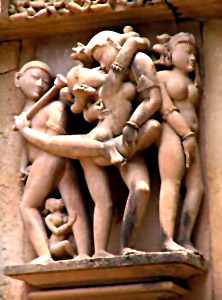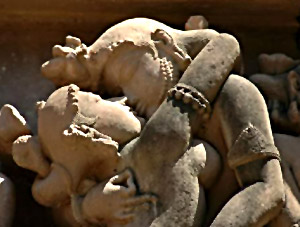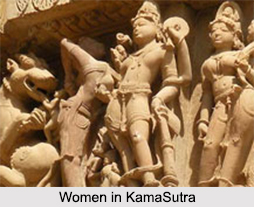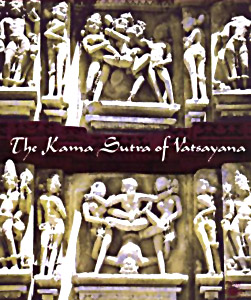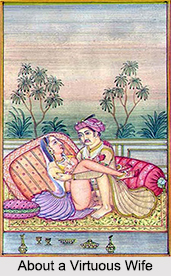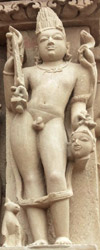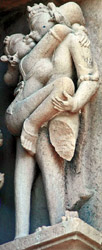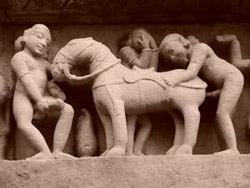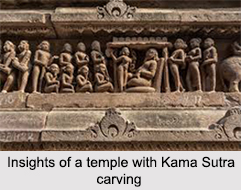 When a man marries a woman who is virgin and of same caste they get Dharma and Artha, and the other factors like good offspring, attraction, number of friends, immaculate love increases day by day. So it is desirable that a man should marry a girl, who belongs to a highly respectable family, possessed of wealth, well connected, whose parents are alive, and more than three years younger to him. The other criteria are: she should be beautiful, of a good nature, with lucky marks on her body, and with good hair, nails, teeth, ears, eyes and breasts, without any of them are often given the remark as defective. The criteria of having these qualities are applicable to man also. While according to Ghotakamukha, girl attached to other man should never be loved.
When a man marries a woman who is virgin and of same caste they get Dharma and Artha, and the other factors like good offspring, attraction, number of friends, immaculate love increases day by day. So it is desirable that a man should marry a girl, who belongs to a highly respectable family, possessed of wealth, well connected, whose parents are alive, and more than three years younger to him. The other criteria are: she should be beautiful, of a good nature, with lucky marks on her body, and with good hair, nails, teeth, ears, eyes and breasts, without any of them are often given the remark as defective. The criteria of having these qualities are applicable to man also. While according to Ghotakamukha, girl attached to other man should never be loved.
Both for the men and women getting married to the right kind of counterpart is necessary as this not only aids in augmenting the mood for the copulation but at the same time supports in enhancing the society with suitable offspring.
A marriage can be solemnized when fortune, signs, omens, and the other person`s words are favourable. Ghotakamukha sats, a man should not marry at any time he likes. A girl who is asleep, crying, or gone out of the house when sought in marriage, or who is affianced to other man, should not be married. The following also should be avoided:
•One who is kept concealed
•One who has an ill-sounding name
•One who has her nose depressed
•One who has her nostril turned up
•One who is formed like a male
•One who is bent down
•One who has crooked thighs
•One who has a projecting forehead
•One who has a bald head
•One who does not like purity
•One who has been polluted by another
•One who is affected with the Gulma
•One who is disfigured in any way 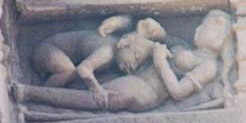
•One who has fully arrived at puberty
•One who is a friend
•One who is a younger sister
•One who is a Varshakari.
A girl, who is called by the name of one of the twenty-seven stars, a tree, or a river, or whose name ends in `r` or `I` is considered worthless. But according to some authors the prosperity is gained by marrying a girl who is loved to the other one.
When the girl achieves the marriageable age, the parents become worried and do many things, which can be proved as favorable to them: like they dress her smartly, send with some of her friends to sports, and various functions mainly to the marriage ceremonies. And when the man that means who is going to marry the girl comes to the house of the girl with his friends, the parents ask him to relax first and then to have bath and dinner. But he usually not listening to them tells to settle the matter later.
When a girl is thus acquired according to the custom of the country, or his own desire, he should marry her according to the Hindu marriage rule in any one of the four kinds of marriage.
Thus the story of marriage ends here.
 There are also some verses on the subject as follows:
There are also some verses on the subject as follows:
`Amusement in society, such as completing verses begun by others, marriages, and auspicious ceremonies should be carried on neither with superiors, nor inferiors, but with our equals. That should be known as a high connection when a man, after marrying a girl, has to serve her and her relations afterwards like a servant, and such a connection is censured by the good. On the other hand, that reproachable connection, where a man, together with his relations, lords it over his wife, is called a low connection by the wise. But when both the man and the woman afford mutual pleasure to each other, and when the relatives on both sides pay respect to one another, such is called a connection in the proper sense of the word. Therefore a man should contract neither a high connection by which he is obliged to bow down afterwards to his kinsmen, nor a low connection, which is universally reprehended by all.`
